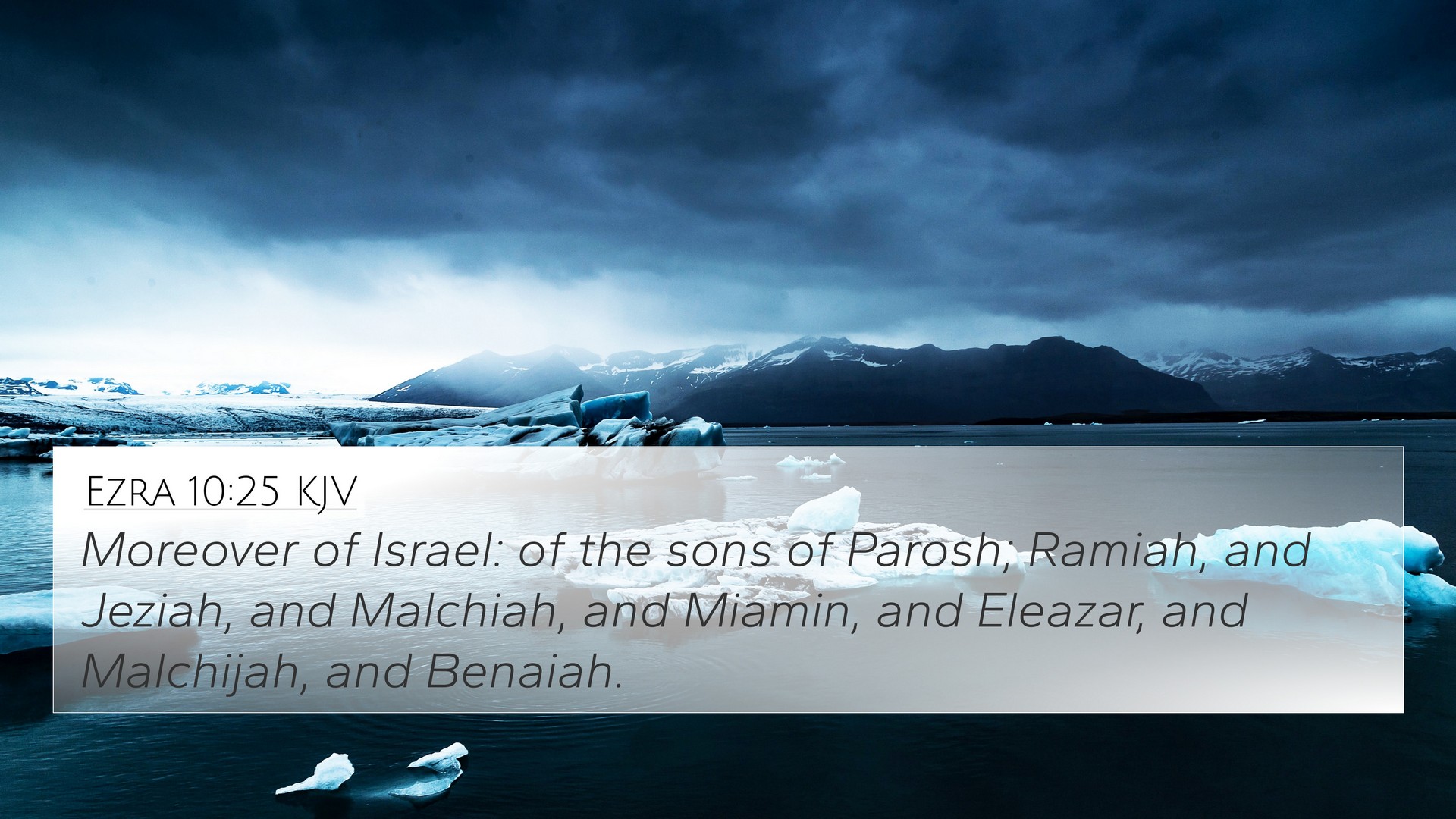Understanding Ezra 10:25
Ezra 10:25 states: “And of Israel's sons, the sons of Parosh, Ramiah, Izziah, Malchijah, Maassiah, and Shimei. All these took strange wives, and some of them had wives by whomever they would.” This verse provides insight into the serious issues of intermarriage among the Israelites during the return from exile. Below we will explore the meaning of the verse through insights from public domain commentaries.
Context of Ezra 10:25
The context of this verse lies in the broader narrative of Ezra's efforts to restore the spiritual integrity of the returned exiles. After recognizing that many of the people had married foreign women, Ezra gathers the community to address this issue. The verse specifically lists those who had taken strange wives, highlighting the plight of the families involved and the implications for Israel's covenant identity.
Commentary Insights
- Matthew Henry's Commentary: Matthew Henry emphasizes the gravity of the problem of mixed marriages, linking it to a disobedience to God's law. He notes that the Israelites' intermarriage with pagan nations led to compromises in their worship and practices, diluting their identity. Henry points out that such relationships often lead to spiritual decay.
- Albert Barnes' Notes: Barnes discusses the list of men who took strange wives. He suggests that this indicates not just individual failures but a systemic issue within the community. He reflects on the importance of maintaining purity in relationships to fulfill God's command. Barnes highlights that the leadership's acknowledgment of sin was vital for restoration.
- Adam Clarke's Commentary: Clarke elaborates on the term "strange wives," suggesting it refers to foreign women who worshipped other gods. He provides a background on how these marriages could lead Israel away from worshipping Yahweh and into idolatry, which was expressly forbidden in the Law.
Thematic Connections
In examining Ezra 10:25, we can identify several connections to other biblical texts and overarching themes. These connections can provide a framework for understanding how the scripture speaks to issues of faithfulness, identity, and community.
- Deuteronomy 7:3-4: This passage explicitly forbids intermarriage with other nations to prevent turning away from God.
- Nehemiah 13:23-27: Similar to Ezra, Nehemiah addresses intermarriage and its consequences, reinforcing the message of community purity.
- 1 Corinthians 6:14: This New Testament verse speaks to the idea of not being unequally yoked, drawing parallels with the principles found in Ezra.
- Malachi 2:11: Malachi condemns the act of marrying foreign women and connects it to unfaithfulness against God.
- Joshua 23:12-13: Joshua warns the people of the detrimental effects of intermarriage with surrounding nations, reminiscent of Ezra’s concerns.
- Ezra 9:1-2: This earlier passage sets the stage for Ezra 10:25 by revealing the initial problem of intermarriage.
- Romans 12:2: Paul encourages believers not to conform to the patterns of this world, which resonates with Ezra's call for separation from foreign practices.
Cross-Referencing Biblical Texts
The study of Ezra 10:25 provides a valuable opportunity for cross-referencing and thematic exploration within the Biblical narrative. Cross-referencing Bible texts helps to illuminate connections across Scripture, enriching our understanding of God's intent and the consequences of disobedience.
Tools for Bible Cross-Referencing
To delve deeper into these scriptural connections, utilizing various resources can be beneficial:
- Bible Concordance: These tools enable users to track keywords across different books, aiding in finding related verses.
- Bible Cross-Reference Guide: Guides designed to facilitate finding thematic links between verses.
- Cross-Reference Bible Study: Methods employing structured approaches to engage with interconnected scriptures.
Conclusion
Ezra 10:25 serves as a crucial reminder of the importance of fidelity to God's commands, community integrity, and the potential consequences of straying from divine guidelines. Understanding this verse in light of its context and its relationship to other scriptural teachings enhances our spiritual journey and commitment to living according to God's will.
By exploring the themes and cross-references associated with Ezra 10:25, we gain a more comprehensive view of its meaning and implications for both the immediate context and broader theological discussions.




